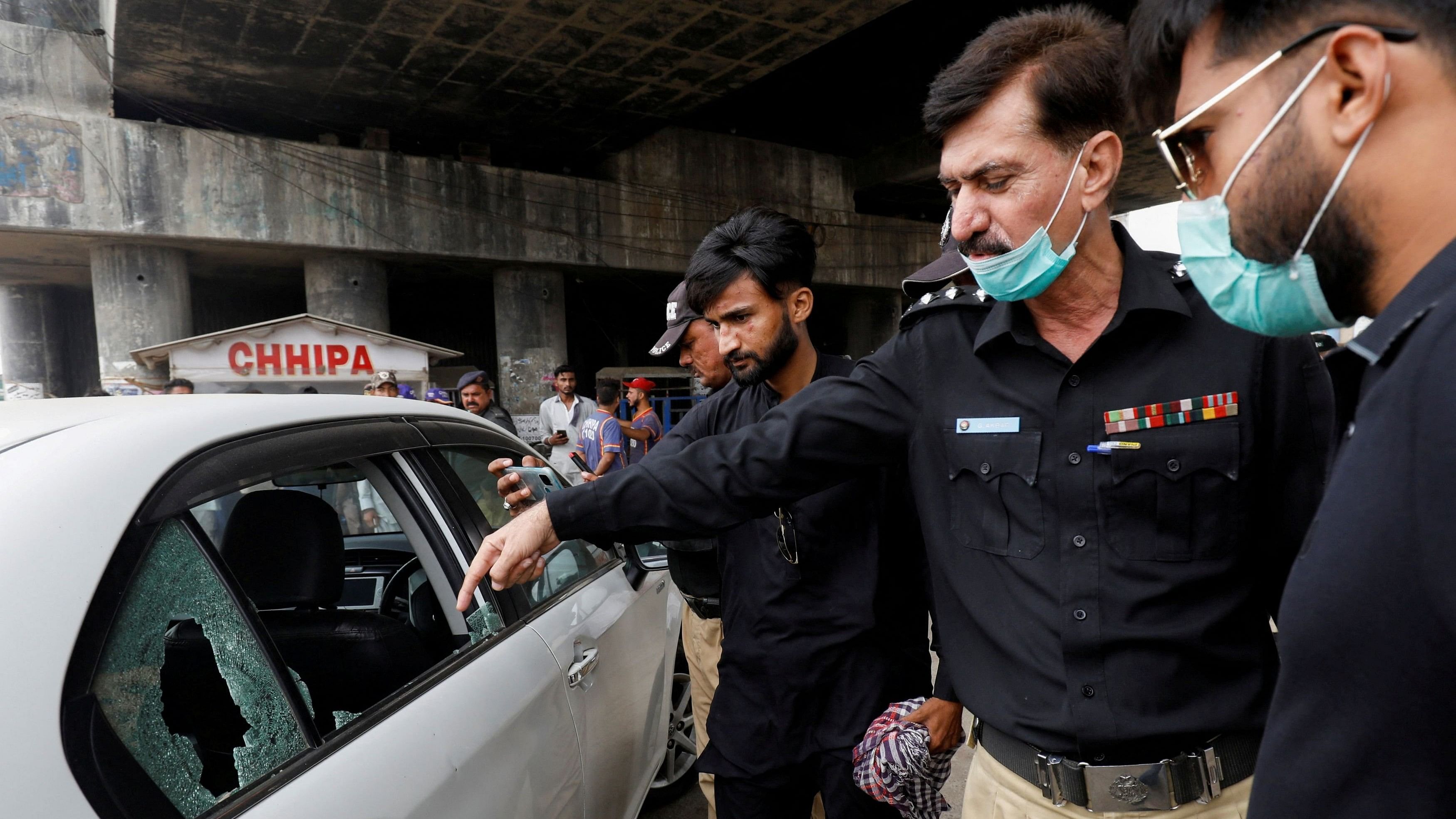
A Pakistani police officer surveys the site after gunmen on a motorcycle opened fire on a vehicle belonging to a Chinese national, along a road in Karachi, Pakistan
Reuters File Photo
Pakistan has traditionally described its relationship with China in almost reverential terms, often calling it “deeper than the seas and higher than the mountains.” However, this sentiment was recently challenged when Chinese Ambassador Jiang Zaidong labelled two attacks on Chinese nationals working in Pakistan, in March and October 2024, as “unacceptable,” delivering a clear message to both Pakistan’s civilian and military leadership.
Zaidong was speaking at the “China at 75: A Journey of Progress, Transformation & Global Leadership” seminar hosted by the Pakistan-China Institute on October 30. The think tank is headed by ex-Senator Mushahid Hussain, an erstwhile establishment favourite and prominent India baiter who has recently aligned his fortunes with ousted former Prime Minister Imran Khan.
The Chinese diplomat’s remarks were caustic enough to invite a sharp response from Mumtaz Zahra Baloch, the spokesperson for Pakistan’s Foreign Office, a day later on October 31. She termed Zaidong’s statement “surprising and not reflective of diplomatic traditions.”
The bombing on October 6, 2024, involved a pick-up truck rigged with nearly 100 kg of explosives. The vehicle waited unchecked for about 40 minutes near the outermost security cordon of the heavily guarded Karachi airport before the driver rammed it into a car carrying two Chinese engineers returning to work on a project after a holiday in Thailand. Both engineers were killed, and several others injured. The separatist militant group Baloch Liberation Army (BLA) later claimed responsibility for the attack.
China has grown increasingly frustrated by the spate of attacks on its nationals working on various infrastructure and power generation projects in Pakistan under the China-Pakistan Economic Corridor (CPEC) initiative. Officially launched by President Xi Jinping during his visit to Pakistan in April 2015 as part of the Belt and Road Initiative (BRI), the CPEC has brought an estimated 12,000 Chinese experts, engineers, and technicians to Pakistan. Their work spans projects like the development of Gwadar Port as a dual-use economic and naval hub, the construction of the Gomal Zam Dam in South Waziristan, the Neelum and Kohala hydroelectric projects in Pakistan-occupied Kashmir (PoK), and the Diamer Bhasha Dam in Gilgit-Baltistan (GB).
Chinese technical experts have also been instrumental in keeping the strategically vital Karakoram Highway open by clearing landslides and building tunnels near Hunza Lake. However, Baloch separatists and Tehrik-e-Taliban Pakistan (TTP) militants have intermittently attacked Chinese workers, even kidnapping some. This has necessitated the deployment of two separate divisions of the Pakistan Army to provide security.
Previously known as the ‘Karakoram Security Force,’ one of these units has been rebranded as the 34 Infantry Division and is now tasked with securing the Punjab and Khyber Pakhtunkhwa segments of the CPEC. Headquartered in Chilas (Gilgit-Baltistan), it operates under the supervision of X Corps in Rawalpindi. A second unit, the 44 Infantry Division, is stationed in Gwadar under XII Corps in Quetta, focusing on securing the Baluchistan and Sindh segments of CPEC.
Prime Minister Shahbaz Sharif has reportedly assured Chinese officials of better security measures during recent discussions at the Climate Summit in Baku (12-13 November). However, Islamabad’s failure to deter these attacks appears to have angered Beijing, which is reportedly pressuring Pakistan to formalise a joint security management system. This arrangement could involve the long-term deployment of Chinese military personnel in Pakistan.
When questioned by Reuters, Lin Jian, the Chinese Foreign Ministry spokesperson, denied familiarity with such discussions, stating only that China would continue strengthening cooperation with Pakistan to maintain the security of its personnel, projects, and institutions. However, Pakistani security sources with direct knowledge of the negotiations have reportedly acknowledged receiving a written proposal from Beijing, which includes a clause permitting the deployment of military forces in each other’s territory for counter-terrorism missions and joint strikes.
Last week, Pakistan’s Interior Ministry announced that both sides had agreed to develop a joint strategy to prevent similar incidents. However, the Inter-Services Public Relations (ISPR), the information wing of the Pakistan Army, has refrained from commenting on the specifics of potential joint operations. A security official suggested that Pakistan prefers Chinese assistance in improving intelligence and surveillance capabilities rather than direct military involvement, indicating possible reluctance to allow a permanent Chinese military presence.
Responding to media queries during her weekly press briefing in Islamabad on 14 November, Mumtaz Zahra Baloch urged journalists “not to respond” to “media speculations based on unreliable sources” that she claimed were “motivated by an agenda to create confusion about the nature of this relationship.” She echoed Lin Jian’s assertion that both countries possessed “the resolve and capability to foil any attempt to harm China-Pakistan relations.”
Chinese military personnel have previously deployed temporarily in PoK and GB. However, a prolonged Chinese military presence in these regions could have adverse diplomatic and military repercussions for India, though it is unlikely to disrupt the ongoing détente along India’s northern and northeastern borders.
(The author is a former Special Secretary in the Cabinet Secretariat, Government of India)